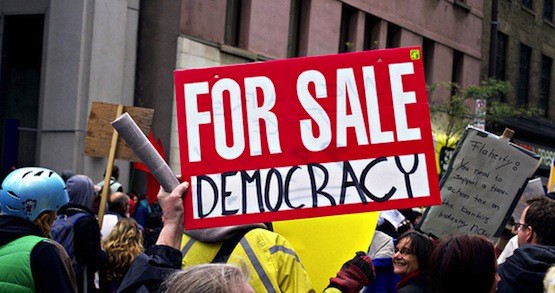
Annual political donation data for 2011-12 has been released by the Australian Electoral Commission, and once again we’re left to go through inconsistent, out-of-date and confusing information provided by the parties and donors, with the AEC doing its best to provide maximum functionality for the information.
Given 2011-12 was a non-election year (other than in Queensland), donors, donations and public funding are naturally down — Labor’s total receipts state and federally were down from $83 million to $49 million, the Liberals from $104 million to $55 million.
Federal Labor has retained its practice of recent years of reporting all receipts over $1000, in line with the legislative model rejected by the Coalition and Steve Fielding in the Senate under Kevin Rudd, and which may yet return to the Senate this year. NSW Labor didn’t bother, sticking resolutely to the threshold for its mainly union-sourced donations. The vast bulk of federal Labor receipts are small “other receipt” contributions, usually for the purchase of seats at party fundraisers.
This leads to the problem of whether such contributions are effective donations or whether they’re for the purchase of some form of product — like access to a minister for lobbying purposes — which means they’re potentially not reportable under Commonwealth law. Many donors remain (understandably) confused about what the requirements are simply under Commonwealth law, let alone under both Commonwealth and applicable state laws. Some companies, like Macquarie Bank, simply avoid the problem by being transparent about everything they give to parties.
In the absence of any broad trends, there are a number of notable facts from the data:
- Labor was punished by the hospitality industry for its flirtation with poker machine reform, with the Victorian-based Australian Hotels and Hospitality Association giving the federal Liberals $55,000, the federal branch of the Australian Hotels Association giving $250,000 and the SA branch giving the Liberals there nearly $50,000 and Labor a token $5,000. Only Clubs NSW preserved a semblance of balance, giving $50,000 to the federal Liberals and $44,000 to federal Labor. Don’t forget, however, much of ACT Labor’s funding comes from poker machines — the branch received a $300,000 donation from the Canberra Labor Club.
- Labor and resource companies had something of a rapprochement. After the mining tax-induced flight of donations to the Coalition, Labor recovered somewhat: Santos, as always, gave to both sides, but favoured the Coalition less this year than 2010-11; Chevron gave more in total to Labor than the Coalition; Woodside gave over $100,000 to both sides; overall, though, mining company donations were well down on 2010-11.
- After sitting out the 2010 election, ANZ is back: it gave $80,000 to Liberal and Labor, while NAB favoured the Liberals by a big margin. International financial giant Visa also gave generously, mainly to Labor, sinking well over $100,000 into federal Labor coffers.
- The Liberals continued to do well from high-wealth individuals: businessman Russell Aboud gave the Liberals $100,000; Harold Mitchell (who doesn’t yet have a return listed by the AEC) gave them $110,000; mining magnate Mark Creasy gave them $84,000. US defence contractor Raytheon also dropped $38,500 on the Liberals (without a return) while giving a token amount to Labor. The only donor of note for the federal Greens was Lithgow GP Richard Stiles, who gave over $15,000.
- Before his feuding with the Newman government, Clive Palmer gave around $170,000 to the LNP, and $27,500 to the federal Nationals.
- Labor continued to do well from Chinese investors, a traditional strength the party has cultivated, particularly in New South Wales — and in spite of trying to ban foreign donations in 2009. However, the days of the big six-figure donations look to be coming to an end. Chau Chak Wing’s Kingold Group gave nearly $50,000 to Labor; he gave Labor $90,000 via another company, Hong Kong Kingson, through the ACT branch, and gave the Nationals over $32,000; Labor also picked up $11,000 from Hong Kong-based Weidong Liu. Huawei also gave $11,000 to Labor and may have donated below the reporting threshold to the Liberals, too, but we don’t know since they too didn’t bother with a return. Optus gave $43,000 to Labor and a total of about $48,000 to the Coalition.
- Bob Katter gets whatever prize might exist for the most eclectic range of donors. His party scooped up a total of over $1 million in total donations from donors such as the Electrical Trades Union and the CFMEU (Katter supports rolling back what’s now left of the ABCC even further), from a range of shooting organisations such as the Sporting Shooters’ Association, gun manufacturer NIOA, the Firearm Dealers Association and the Queensland Military Rifle Club; James Packer’s $250,000 donation, and a $50,000 donation from John Singleton.
However flawed, the data is an invaluable resource that needs detailed analysis over days and weeks: if you spot something in the returns, send us a tip: boss@crikey.com.au.
CORRECTION: This article has been amended to reflect an error on the AEC site relating to Singtel Optus, and to clarify the sources of the KAP donations.
Related stories:








I think anyone giving Labor money will not see a return until 2035 or beyond
Bribery by any other name sounds just like ‘political donations’
MP: More likely to be tax deductible donations.
I’m curious why AusAid gave $110,000 to The Australian Green Party…
To help set up other Green parties in developing countries? Is this really the best way to spend our Foreign Aid budget?
The large company that I work for has a very strict policy for not accepting gifts from customers, suppliers etcetera. They do this so to as preempt any possible conflict of interest and to establish best practice in business ethics. When political parties accept donations from the corporate world is gives the strong outward appearance to the public that they are being bought.